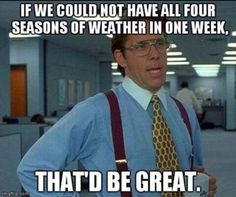Vocabulary
experience: (v.) an encounter of an event or occurrence
seasons: (n.) the four different times of year that is marked by particular weather patterns and daylight hours (spring, summer, fall, winter)
geared: (v.) adjust or adapt something to suit a special purpose or need
predicted: (v.) say or estimate something (specific) that will happen in the future
forecast: (n.) a prediction or estimate of future events, especially coming weather or a financial trend.
strolling (v.) walk in a leisurely way
Mother Nature (n.) Mother Nature is a common personification of nature that focuses on the life-giving and nurturing aspects of nature by using a mother figure as a symbol.
teasing (v.) make fun of or attempt to get a reaction from (a person or animal) in a playful way.
indecisive (adj) (of a person) not having or showing the ability to make decisions quickly and effectively.
Vocabulary Exercise:
Write your own sentence for each of the sentences above.
1. experience ________________________________________________________
2. seasons ___________________________________________________________
3. geared ___________________________________________________________
4. predicted___________________________________________________________
5. forecast ______________________________________________________
6. strolling ______________________________________________________
7. Mother Nature ______________________________________________________
8. teasing ______________________________________________________
9. indecisive ______________________________________________________
Grammar point: Conjunctions
A conjunction is a part of speech that is used to connect words, phrases, clauses, or sentences. When using conjunctions,all the parts of a sentence must agree. There are several different types of conjunctions that do various jobs within sentence structures; subordinating conjunctions, coordinating conjunctions, correlative conjunctions, and conjunctive adverbs.
Subordinating conjunctions join dependent clauses to independent clauses. Coordinating conjunctions join two or more sentences, main clauses, words, or other parts of speech which are the same syntactic importance. Correlative conjunctions work in pairs to join phrases or words that carry equal importance within a sentence. Lastly, conjunctive adverbs connect one clause to another, and are used to show sequence, contrast, cause and effect, and other relationships.
An example from the paragraph above is the word "yet" in "On a Monday one can find themselves geared up for the next 3 foot snow fall that has been predicted in the forecast, yet on a Friday find themselves strolling through the neighborhood wearing nothing but a T-shirt on their back." Another example of a conjunction is in the paragraph when "and" connects two ideas of equal importance, "Mother nature seems to enjoy teasing New Yorkers giving them good weather one minute, and bad weather the next.
Grammar Activity
Create a sentence for each of the word pairs below, using conjunctions to connect the two given words.
1. (happy/sad) ________________________________________________________
2. (cat/dog) ________________________________________________________
3. (hike/work)________________________________________________________
4. (soccer/tired) ________________________________________________________
5. (study/good grades) ________________________________________________________


Good explanation of conjunctions and vocbulary!
ReplyDelete